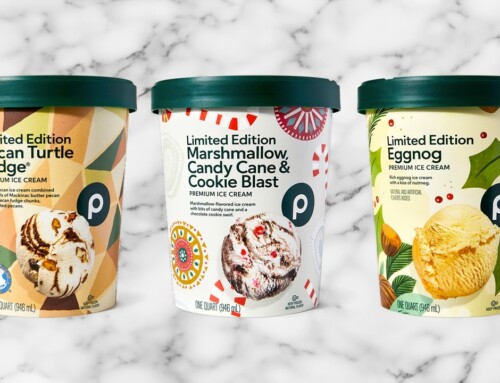This guest post comes from Aimee Becker, Senior Vice President, Global Strategic Advisory of Daymon.
[/et_pb_text][et_pb_text _builder_version=”4.4.6″]The COVID-19 pandemic has transformed the grocery shopping experience, with budget restrictions becoming a top priority. Roughly one-third of all US households have experienced an income decrease, either through the loss of employment, reduced hours or pay reductions. We know that, in these extraordinary times, Private Brands see increased trial and growth as affordable options that consumers pick up to help stretch their smaller budgets. What many consumers may not have yet fully realized is the shift that has taken place in Private Brands over the past decade – while lower prices may incite trial, Private Brand quality, breadth, and innovation will be what makes them valuable. Retailers have a unique opportunity to utilize and strengthen their Private Brands to offer short-term assistance and long-term support as consumers adjust to this new normal.
Private Brand growth has expanded exponentially during this unprecedented time, assisting consumers when they need it the most. With the initial shopping surge from the virus, consumers pantry-loaded and stocked up on critical categories such as frozen and grocery as they purchased for longevity. With this huge demand influx onto the system, consumers are forced to be brand agnostic, with the option of only buying what was available rather than the usual broad selection. Nearly 70% of shoppers are purchasing different brands due to decreased wages and limited stock. Private Brands have grown as consumers are forced to try products and brands that they have never purchased before.
The forced trial provides a crucial opportunity for retailers to engage consumers with the Private Brands more broadly, shifting this trial into loyalty
The forced trial provides a crucial opportunity for retailers to engage consumers with the Private Brands more broadly, shifting this trial into loyalty. With 81% of shoppers currently buying Private Brand products, research shows that trial today will lead to long-term conversion. Heavy Private Brand shoppers are spending around 50% of their grocery budgets with one retailer, reinforcing the notion that well-rounded Private Brand portfolios increase shopper engagement. Retailers must think ahead to ensure that their Private Brands are best-positioned to provide consumers with continued relief through and beyond the current crisis. Retailers must consider the mindsets and needs driving consumers’ new shopping habits to strengthen their Private Brands in three ways: having the right items at the right prices; adjusting marketing and merchandising to engage consumers, and driving innovation to expand solutions across the store.
Maintaining Quick Solutions
Center Store departments are not to be overlooked during this time, as shoppers will continue to search for quick meal solutions. While this space has seen an increased threat from e-commerce and other services, such as autoship subscriptions, the pandemic has interrupted the convenience and availability of these solutions, allowing grocery retailers to reassert themselves as destinations for these options. Shelf-stable options will continue to be crucial as consumers look to keep pantries stocked, spread their budget as far as possible, and prepare for continued unknowns.
Creating Inspiration
With dining out restrictions in place, consumers have increased their number of at-home meals, driving them to seek out creativity in daily meal planning. In the short-term, this may especially include the reality of making meals from a limited selection of ingredients, or of not having strong culinary skills. As trusted experts, retailers should provide educational tools to show consumers how to prepare and cook a spectrum of meals, as well as inspiration for how to create new family favorites or swap out easy substitutions to best use what they have on hand. Incorporating Private Brands into these recipes and tips will raise awareness, showcase breadth and versatility, and inspire new purchases for their home meals.
In-store, the perimeter will be especially important as consumers seek out ingredients and food service options to diversify their meals. Value-added meats and proteins, for example, can provide alternatives to more standard options without requiring shoppers to be the experts themselves. These fresh items can also be a crucial part of inspiration post-cooking – assisting consumers in creating social media-worthy dishes to be shared with friends and family.
Generating Normalcy
While shoppers are focused on budgeting their shopping trips, Private Brand growth in discretionary categories signifies consumers are actively looking to treat themselves with small indulgences. Offering affordable luxuries such as chocolate, beauty products, and alcoholic beverages can help shoppers establish a sense of normalcy in shopping routines. Private Brands should also continue to innovate, even in expected categories, to provide new and exciting options for consumers to try; this will also drive stronger loyalty as they continue to try new items within the brands.
Retailers should also consider the shifts in consumers\’ personal lives that will define what ”normalcy” means. With many children stuck at home, or friends celebrating birthdays far away, non-foods categories should also not be ignored. Private Brands that extend into these seasonal and non-foods categories can play a leading role in creating fun or unexpected solutions for consumers from an assortment standpoint. Marketing and merchandising should also play a role in rounding out these cross-category ideas and solutions.
The COVID-19 pandemic has upended many aspects of consumers\’ lives already, with an economic downturn set to change not only the way consumers shop in the future but challenge retailers\’ approaches to meeting these needs. Where Private Brands had already started to resonate with consumers, these new uncertainties call for retailers to ensure their Private Brands are focused on the right things to provide support and inspiration where consumers will need it the most.
[/et_pb_text][/et_pb_column][/et_pb_row][et_pb_row column_structure=”1_4,3_4″ admin_label=”Row” _builder_version=”4.4.6″][et_pb_column type=”1_4″ _builder_version=”4.4.6″][et_pb_image src=”https://velocityinstitute.org/wp-content/uploads/2020/05/Aimee-Becker.jpg” title_text=”Aimee Becker” _builder_version=”4.4.6″][/et_pb_image][/et_pb_column][et_pb_column type=”3_4″ _builder_version=”4.4.6″][et_pb_text _builder_version=”4.4.6″]Aimee Ferreira Becker
Daymon, Senior Vice President, Global Strategic Advisory
Aimee started her career with Daymon in 2010 and currently serves as the Senior Vice President of Global Strategic Advisory. Under her leadership, the Strategic Advisory team works with retailers and manufacturers globally to build Private Brand programs that are positioned and managed for long-term growth. Consisting of six key verticals — Insights & Analytics, Retail Transformation, Brand Strategy, Category Solutions, Quality Assurance and Creative Services — the team works collaboratively to bring insights to actions quickly, with a constant line of sight to flawless execution.
Aimee possesses over 20 years of CPG industry experience in branding, marketing, and analytics. She joined Daymon from Boom! Creative Development, where as a Marketing Director she managed all product development and branding initiatives for several domestically and internationally distributed beauty product lines. She also has prior marketing strategy/brand management experience from her roles at Revlon, Jane and Company, and Coty Beauty. In her early career, Aimee built strong analytical and category management skills from working at Information Resources Inc. and Motts. Aimee earned her Bachelor of Science degree in Entrepreneurial Studies and Marketing from Babson College.
Aimee is an expert in Private Brand strategy and regularly provides the industry with a perspective on the state of Private Brands. She is frequently recognized for her expertise, most notably as a Griffin Report Women of Influence in the Food Industry inductee (2015) and Progressive Grocer Top Woman in Grocery (2014, 2017, 2019).
[/et_pb_text][/et_pb_column][/et_pb_row][/et_pb_section]Related Incites
2025 EVENTS
TICKETS, SPONSORSHIPS & EXPO BOOTHS NOW AVAILABLE







